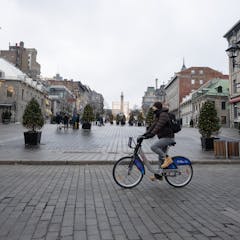
Articles on Fossil fuels
Displaying 1 - 20 of 640 articles

While governments are often blamed for a perceived ‘unjust transition,’ it is actually the industry itself which poses the biggest threat to the future of oil and gas workers.

A fossil fuel ideology transcends political lines and inhibits effective action on the green transition. Alberta is a clear example.

Mainstream economics has been complicit in the climate change crisis as it falsely treats climate change as a mere side-effect of production or a minor aberration.

While some countries are more likely than others to sign an international agreement to phase out fossil fuels, measures to tackle fossil fuel demand by adding a higher carbon price are essential.

Why the public resistance to carbon tax policies? New research suggests a few key factors that may play a role in influencing popular support for carbon tax efforts in Canada.

Cement and fossil fuel production has reached unprecedented levels, with most of the emission growth traceable to a relatively small number of companies.

Knowing which parts of Africa best help to store carbon means funding and policy efforts can be directed to protecting and increasing this carbon ‘land sink’.

Not all activists are in the media spotlight, but they’re crucial to promoting action to slow climate change.

New charts and data show how corporate demand could boost clean energy investment in regions where renewable energy potential is strong but wind and solar power have lagged.

Never mind the carbon tax. Tax breaks and public spending for fossil fuel companies cost taxpayers billions every year and hurt the environment.

Carbon capture is turning the oil and gas industry into a critical player for mitigating climate change – while its products continue to heat up the planet.

Bill C-372 does not curtail free speech and, if anything, demonstrates how banning fossil fuel ads does not go nearly far enough.

If Africa built only all the renewable power plants it has already planned, this would be enough to generate 76% of all electricity needed on the continent by 2040.

Climate change is often seen as solely a technical problem. This is a misguided belief. Understanding how to build a better world begins, and ends, with understanding the societies which inhabit it.

A first-of-its-kind legal decision puts native title holders in a stronger position when fighting fossil fuel projects. The Gomeroi people won their appeal against the Native Title Tribunal.

Scientists have been debating the start of the Anthropocene Epoch for 15 years. I was part of those discussions, and I agree with the vote rejecting it.

Planting trees to remove carbon from the atmosphere will only be effective alongside other strategies to reduce greenhouse gas emissions.

For the green transition to be fair and just to people and communities around the globe, countries must change the way energy is used and governed.

Extractive mining disrupts the balance of the planet’s ecosystems and is set to rise. Could urban mining or degrowth help curb unsustainable practices?

The US Department of Energy will review its process for approving new LNG projects.





